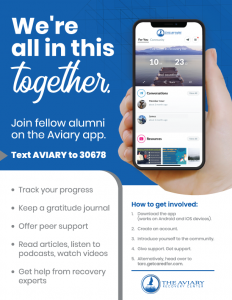
at (314) 464-0222. We’re here to help.
When it comes to addiction, the numbers do not lie.
Take a look at Missouri: Addiction is a complex issue with a significant impact on individuals, families, and communities in Missouri. Opioid overdose deaths are a major concern, with 1,582 occurring in 2021, accounting for 73% of all drug overdose deaths in the state. According to the Missouri Department of Mental Health, approximately 379,000 Missourians struggle with a substance use disorder. 17,500 of these individuals are young people between the ages of 12 and 17.
Sadly, these numbers don’t include those still suffering or those whom we have lost to the disease of addiction.
With the many treatment options available, pairing the right one with your situation can be confusing. That’s why many people suffering from addiction choose the top successful and highly reviewed drug rehab near St. Louis: Aviary Recovery Center.
Two Locations / Programs: Pathways to Recovery
We offer both an intensive outpatient program (IOP) and a 24/7 residential treatment program.
Intensive Outpatient Program for Drug Addiction
Aviary Recovery’s Intensive Outpatient Program (IOP) is designed for individuals who can manage many aspects of their life without round-the-clock monitoring or inpatient medical detox for alcohol and drugs, or who may have completed a residential treatment stay. Our Intensive Outpatient Program (IOP) schedule allows for one to attend college, manage their work schedule, and maintain their family life while receiving treatment and support necessary for long-term recovery.
Residential Drug Addiction Treatment Program
Recovering from drug or alcohol addiction is no small task, especially if you’re trying to get sober while balancing work, family, and personal responsibilities. While you may be reluctant to leave the comforts of home behind, our drug rehab near St. Louis can provide a solid foundation for lasting sobriety.
Our inpatient drug rehab treatment program is designed for those able to stay at the facility full-time while receiving around-the-clock care and detoxification if necessary. The medical team at Aviary Recovery Center will provide a comprehensive psychological and medical assessment to determine which program is best suited for your long-term sobriety success.
By offering two different programs at two different locations, Aviary Recovery Center has become the most sought-after drug rehab near St. Louis.
What is Residential Addiction Treatment?
Residential addiction treatment refers to a level of care in the field of mental health and substance abuse where individuals receive intensive, 24-hour care within a structured and supportive residential facility. This type of treatment is designed for individuals who require a higher level of care than outpatient services can provide. Inpatient residential addiction treatment is commonly used for conditions such as substance abuse, addiction, mental health disorders, and behavioral issues.
Our Residential Addiction Treatment Center gives those suffering from substance use disorders a safe space to focus on beginning their path to recovery. Clients stay at the facility full-time, receiving 24/7 care from experienced addiction and mental health professionals in a therapeutically designed environment. The process starts with a comprehensive psychosocial, nursing, and medical assessment by the primary therapist. This assessment is then used to create a client-specific treatment plan.
Inpatient residential addiction treatment is an intensive and focused approach to addressing mental health and substance abuse issues. It provides a supportive environment for individuals to break free from unhealthy patterns, gain insight into their conditions, and acquire the skills needed for long-term recovery.
What is Medication-Assisted Treatment?
The Aviary Recovery Center Has the Expertise to Administer MAT
The Aviary Recovery Center team is fully versed in the various medications that can help those with substance use disorders. Medication-assisted therapy should only be pursued under the care of physicians who have expertise and experience in its use. Aviary Recovery Center is a leader in MAT and its uses as part of a personalized approach to care.
What to Bring to Residential Treatment
The following is a list of items we recommend clients bring to make their stay more comfortable. This is a suggested list, and not all prohibited or suggested items are listed. Please discuss items of concern with your counselor or an admissions professional before arrival.
What Items Are Provided by The Aviary?
We will provide you with access to the following items for your convenience:
- Closet space/laundry basket for clothing
- Washer and dryer (detergent & softener)
- Community television (Limited)
- Telephone access (Limited)
- Healthy food and beverages
- Bed linens and towels
What to Bring to Residential Treatment
Comfortable Clothing:
The Aviary is designed to be a less restrictive, home-like environment, so we encourage you to dress comfortably and casually. Clothing should not be overly revealing and shoes should be sturdy and comfortable enough for walks or outings. You will not need to pack for all 30-60 days of treatment, as there are washers and dryers available for regular use. We recommend bringing 8-10 pairs of clothing you can mix & match. We also recommend that you pack comfortable, durable outerwear that can be washed in a commercial washing machine.
- Jeans and full-length shorts
- Blouses and t-shirts
- Tennis shoes
- Sportswear for recreational or fitness activities
- Robe and slippers
- Undergarments
- Seasonally appropriate and outdoor activity clothes. We encourage you to come prepared with several seasonal clothing options (i.e. umbrella, lightweight jacket, sweater, heavier jacket for winter months, sunglasses, hats, etc.)
Dress Code:
- Clothing cannot be revealing or inappropriate (questionable apparel will be determined at the discretion of our recovery staff).
- Night time clothing must be worn.
- Shirts must meet the waistband of pants. No exposed midriffs. Shirts may not show excessive cleavage.
- See-through clothing must be worn with appropriate undershirts. Visible underwear is not appropriate. This applies to men and women.
- Shorts must be mid-thigh or longer when standing (when standing, your shorts should be no shorter than your fingertips when arms are at your side.)
- No clothing with alcohol, drug, sex, or gang themes, terms, or innuendos.
- Pants must cover hips. No exposed underwear. No sagging pants.
- Shoes or socks are to be worn at all times in the house. Shoes must be worn at all times outside the building.
- Clothing must be worn at all times in the house and on the property.
- Sleeping attire may not be worn outside the bedroom.
- Leggings may only be worn if appropriately covered by shirts that fall below the buttocks.
- Gym attire must follow all of the above-mentioned rules: shoes, appropriate length shorts & shirts.
- Men are required to wear shirts at all times: this includes inside the gym and during outdoor exercise.
- Any other clothing that is not specifically mentioned in these rules but is deemed inappropriate by staff must be changed/mailed back home.
- Sunglasses should be worn outside only.
Personal Toiletries:
All personal toiletries must be in their unopened, sealed container. Nail files/clippers, shaving razors and other “sharps” may be brought but will be kept in an assigned box when not being used. You may also bring the following items as they are not provided:
- Feminine products
- Shampoo and conditioner
- Body soap and facial Soap
- Deodorant, lotion, and sunscreen
- Make-up (one small bag allowed)
- Toothbrush/toothpaste
- Hairdryer and hair styling products
Medications:
Prior to/upon admission, please advise the Admissions Staff of all current prescription and non-prescription medications you are taking/bringing with you. Please include the name, dosage, and frequency of each medication, as well as the name of the prescribing physician. You will document your medication on your Medical Self Report form completed before/at admission. All prescriptions must be current, your name must be on the prescription label, and there should be no more than the prescribed amount of pills in the bottle. Please bring at least one week of prescription medications with you.
A nurse at The Aviary will review all medications with you after admission. If you have a prescription card through your insurance company, bring it with you. Prescriptions are filled at the local pharmacy and kept in the medication room. Medication costs are the responsibility of the client.
Over-the-Counter (OTC) Medications:
New, unopened/sealed OTC medications are allowed. Medications with pseudoephedrine ingredients and any/all weight control/pre/post-workout supplements are prohibited.
Money:
All cash/money should be left at home. You will not need cash during your stay at The Aviary as our services are all-inclusive with the exception of medication copay(s).
Miscellaneous:
We want you to be comfortable during your stay and we encourage you to pack a few personal items.
Stationary, envelopes, and stamps are encouraged for writing to family and friends
Hobby or special interest items (crafting materials, coloring books, crossword puzzles etc.)
Photos of family and friends (may be in a frame, remove glass)
Personal notebook for journaling
List of phone numbers
Ear plugs/buds
Stuffed animal(s), favorite pillow, or blanket
Alarm clock, Mp3/Digital audio player (no video/camera capabilities)
Books, Bibles/religious texts, inspirational or devotional reading materials
What to Leave at Home during Treatment
For the safety and confidentiality of The Aviary clients, please do not bring the following items:
- Electronic devices (cell phones, computers, TVs, iPads, DVD players)
- Bluetooth/wireless/wired audio speaker(s)
- Weapons and firearms
- Items of luxury/excessive value (jewelry, perfumes, expensive clothing/accessories etc.)
- Clothing that depicts alcohol, drugs, sex, gangs, or violence
- Products containing alcohol (mouthwash, body spray/cologne, toner, etc.)
- Acetone-based products or aerosol-spray products
- Candles/incense
- Alcohol or illegal drugs
- Outside food(s)/drink(s)
- Vapes, Juuls, or any form of electronic cigarette(s).
- Exceptions may be made for disabilities/medical necessity.
The Aviary reserves the right to refuse any item deemed unsafe or detrimental to client care.
*Prohibited items are not allowed in the facility under any circumstances and will be required to be sent home via postal/parcel service at the owner’s expense. Should the client be unable to provide payment for the postal/parcel service we will require that the item(s) be picked up by a spouse/family member within seven business days from the date of seizure.
Should the item fail to be removed within the allotted time given by The Aviary Recovery Center, a private entity reserves the right to destroy/discard the item(s). The Aviary and its affiliates are NOT RESPONSIBLE for lost, stolen or prohibited items that are not in our immediate, controlled possession.
What if I Leave Items Behind After Discharge?
Items that are left behind after your discharge from The Aviary Recovery Center will be required to be shipped home via postal/parcel service at the owner’s expense. Should the client/family be unable to provide payment for the postal/parcel service we will require that the item(s) be picked up by the client/spouse/family member within 30 business days from the date of discharge.
Should the item fail to be removed within the allotted time given Aviary Recovery Center, a private entity reserves the right to destroy/discard the item(s). The Aviary and its affiliates are NOT RESPONSIBLE for lost, stolen, or prohibited items that are not in our immediate, controlled possession.
 After-Care Program near St. Louis
After-Care Program near St. Louis
Aftercare is an important part of ongoing recovery. At Aviary Recovery Center, we are committed to providing long-term care beyond our residential and outpatient programs. We do this to help ensure the long-term success of our clients, whose recovery begins at The Aviary but continues for decades.
Our alumni group is an opportunity for clients to provide peer support, stay connected with staff, and find resources for sober living. Learn more.
Reference: Reports and Statistics. (2017, January 1). Retrieved October 05, 2017. Missouri Department of Mental Health






